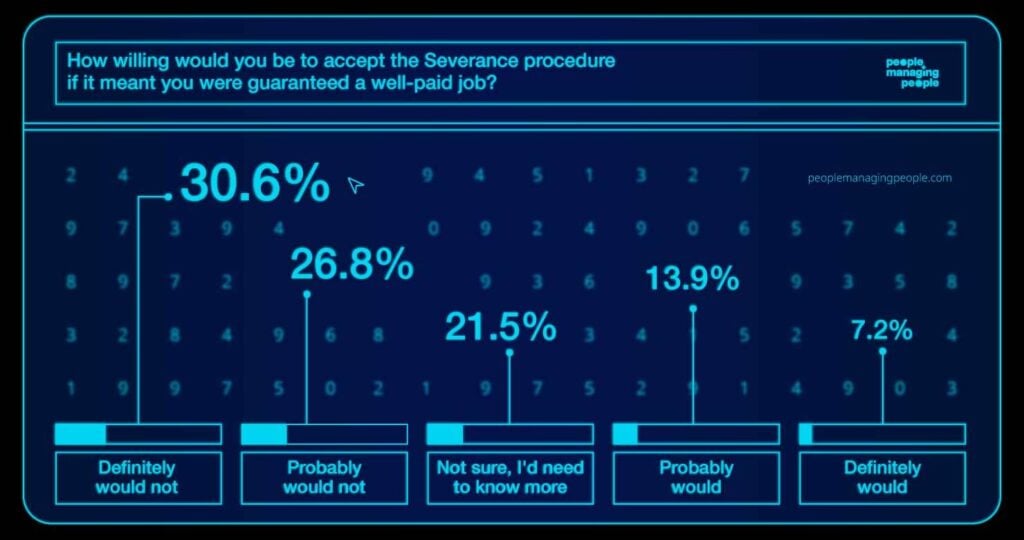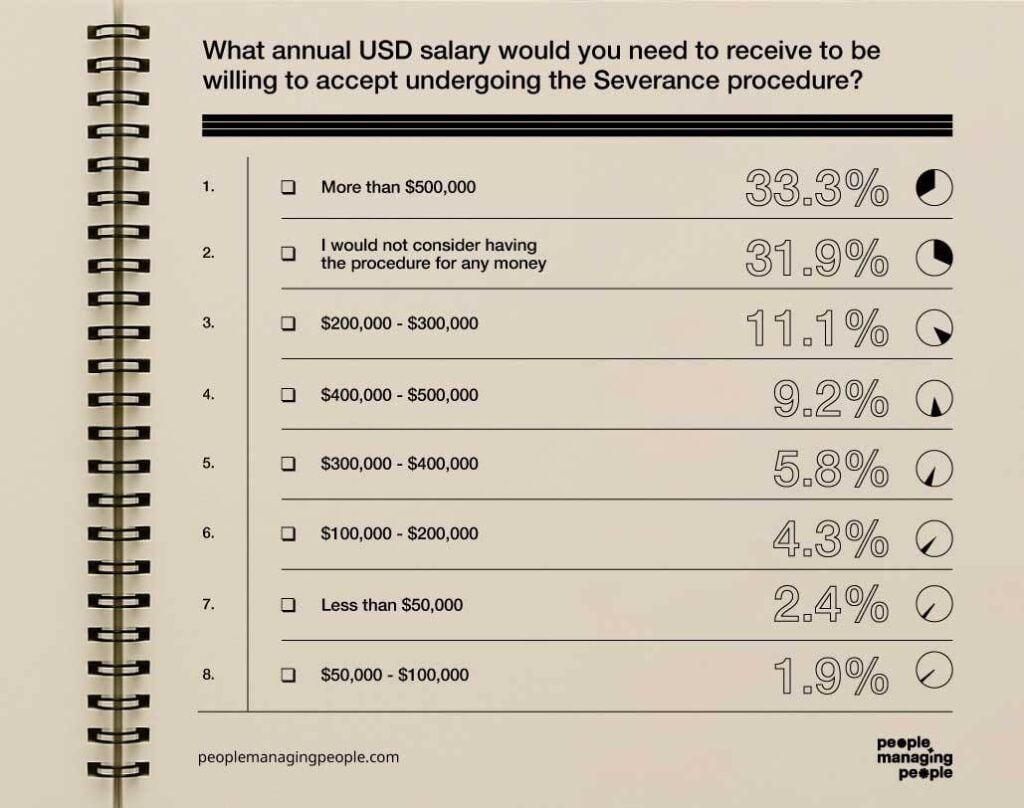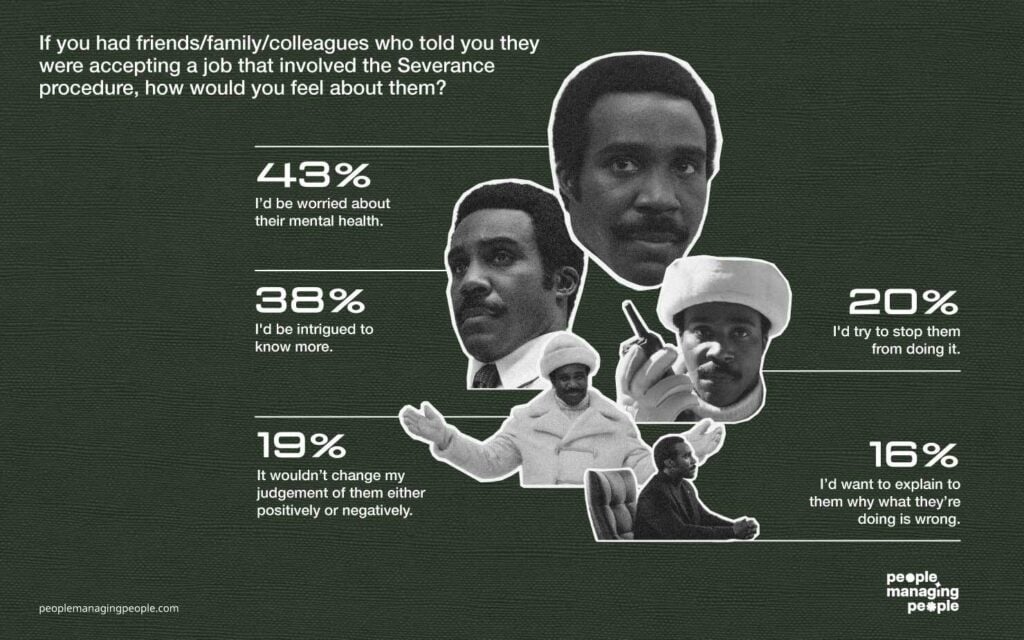Imagine a job where you earn a high salary, enjoy total work-life separation, but never remember what you do during work hours.
Inspired by the dystopian TV series “Severance,” we asked people across the globe: Would you take a job that severs your work and personal identity if it meant guaranteed high pay? What pay would you need to accept having the procedure? How would you feel towards others who told you they were having the procedure done?
More than 200 respondents across the globe revealed some surprising—and polarizing—opinions on what people are truly willing to sacrifice for better compensation, mental health, and work-life balance.
Here are some of the top insights from our survey.

Money Talks: Over Two Thirds Would Sever Their Minds for the Right Salary
56% of respondents stated they would “Definitely not” or “Probably not” be willing to have the procedure.
However, a surprising proportion of respondents admitted they would accept the procedure for a high enough paycheck when asked in the second question. The highest percentage of respondents selected “More than $500,000” (33%), more than “I would not consider having the procedure for any money” (32%) when asked the salary they would need to have the procedure.

Since 32% of the respondents said they wouldn’t accept the procedure for any money, therefore, 68% selected a salary range that would make them consider it.
Interestingly, 47% of respondents in the 18-24 age group either selected “Probably would” or “Not sure, I’d need to know more” when asked if they’d have the procedure with none saying they “Definitely would”. When asked about the salary they’d need, only 15% selected “I would not consider having the procedure” showing that 85% of those in this age group would consider it for a high salary. 42% of respondents said they would for more than $500,000.
Curiosity Over Fear: A Surprising Number Are Intrigued
The fact that 21% of respondents answered “Not sure, I’d need to know more” in response to if they’d have the procedure highlights a growing societal fascination with radical solutions to burnout and workplace dissatisfaction.
When asked how they'd feel if a friend or family member underwent the procedure, 38% of respondents reported being “intrigued to know more”.
One in five people being curious about it and another 20% probably or definitely willing to do it tells me there are a lot of people out there dealing with a desire to disassociate from what they do for a living. If you’re looking for a sign that professions are occupying too much space within people’s identities, there it is.
The Mental Health Dilemma
Despite curiosity, a significant number of participants expressed concern. “I’d be worried about their mental health” was the most common response (43%) when reflecting on others undergoing Severance.

This tension suggests that while the allure of detaching from job stress is strong, people still view emotional and psychological detachment with caution.
Gen X or Millennial Workers Are More Willing to Sever
The 35-44 age group was significantly more open to accepting the severance procedure than older and younger respondents. 37% of respondents in that age range chose either “Definitely would” or “Probably would” when asked if they would accept it. This age group values work-life separation and high income but is also more willing to take radical steps to achieve it.
They’ve had to navigate the job market post recession and spent most of their adult lives with one crisis related to economy and politics after another impacting how they perceive the world. I think this shows a sort of numbness and willingness to disassociate over time.
The Future of Work or a Warning Sign?
While the idea is hypothetical (for now), the willingness to accept such a procedure speaks volumes about workplace dissatisfaction and how work fits into people’s lives. The data reveals a public grappling with burnout, boundaries, and the commodification of labor.
The deeper story: People aren't lazy—they're exhausted, and they're searching for extreme solutions to cope.
As a business owner, consider using employee survey tools and providing mental health support to your staff. By ensuring management is aware of any challenges employees face while also providing the support they need, you’ll be able to act on the discomfort staff are feeling while giving them the techniques to cope with managing their work and personal lives.
Final Thoughts
Our survey shows a startling openness to trade-off consciousness for compensation—an idea that was once science fiction is now a metaphor for how people feel about modern work. The message is clear: if employers don’t start prioritizing mental health, meaningful engagement, and flexibility, workers will continue to dream—perhaps even demand—more radical alternatives.
At People Managing People, we believe that no one should have to sever themselves from their identity just to feel fulfilled or well-compensated at work. This data should be a wake-up call. The future of work must be more human, or it risks losing humans altogether.











Replies to This Discussion